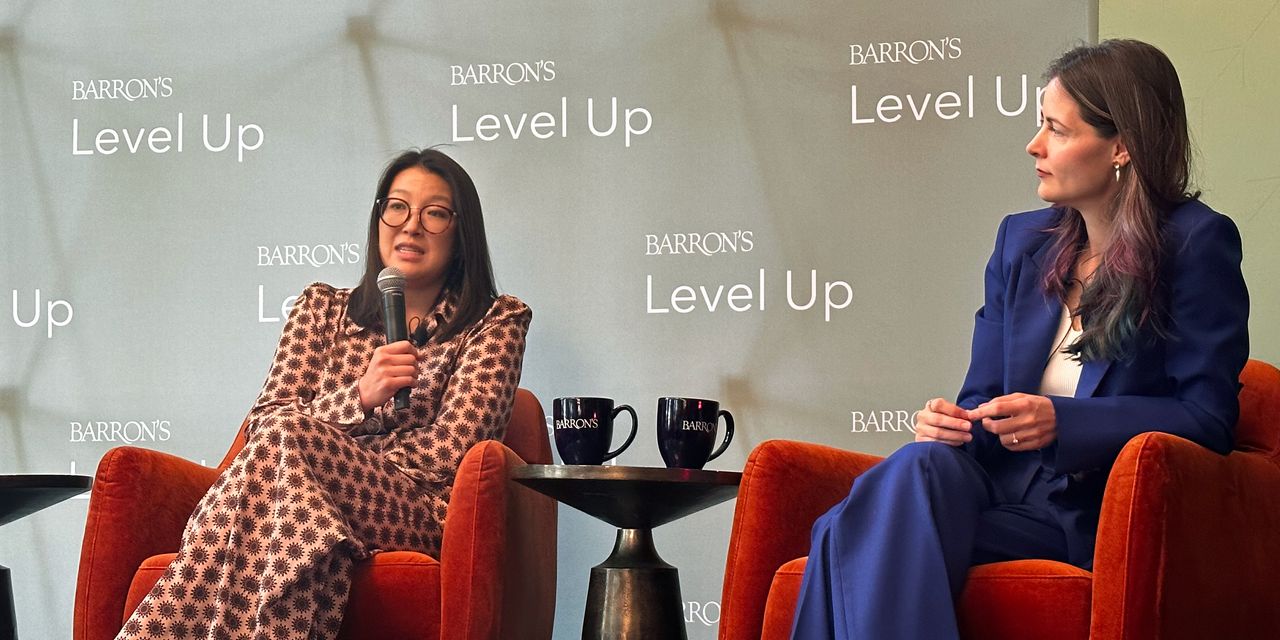The bar for female-founded businesses to find success continues to be “incredibly high” as women in the corporate world face a dearth of funding and uncertain economic conditions, said Ann Chung, senior managing director and global head of consumer for Blackstone Growth.
Chung and other panelists discussed a range of topics relevant to women in business during the Barron’s Level Up event in New York on June 14, including the challenges female-founded start-ups face when searching for funding, how to navigate economic headwinds and lessons learned on their path to entrepreneurship.
Here are the takeaways from the discussion.
Barriers to Entry
Research shows that female-founded start-ups only received 2% of venture capital funding in 2022. Comparatively, women who pitched their company with a man in the room received roughly 16% of funding.
Kathryn Minshew, co-founder of online career platform The Muse, highlighted the challenges associated with being stuck “inside” statistics that showcase how underrepresented female-founded businesses are in the venture capital world. Women have to be “phenomenally buttoned-up” when pitching their start-up, she said.
Uncertain Solutions
Chung said the finance world has found itself “at a loss” for how to address systemic barriers to funding female-founded businesses. To increase investment in women-led start-ups, corporations need to hire more women who will write checks, Chung said, but those roles continue to be dominated by men.
“There hasn’t been movement in the way that I think we would all really like it to be,” she said. “It’s really about cultivating cultures and organizations that are open and honest, and that are freely accepting of women and their ideas.”
Finding Funding in an Unsteady Economy
While working to fund new start-ups during uncertain economic times, Chung has prioritized connections with businesses that have reached profitability. With some consumers limiting their spending because of inflation, businesses must prove they can weather precarious economic conditions. “Especially if you’re a female founder, I’ve found that the bar is even higher and that you do have to have all your I’s dotted and your T’s crossed,” Chung said.
Female-founded start-ups often generate more returns with less capital because of the funding barriers they face, Chung said. Blackstone is seeing a lot more female-founded businesses using their resources more wisely and “doing more with less,” she added.
Although Chung acknowledged that these start-ups face a long road to profitability, she said that once they cross a certain growth threshold, there is a “rush” of success.
More broadly, Chung sees consumers changing their habits because of the economic backdrop—they are willing to spend more on premium products in some portions of their budget and are trading down in other areas. The result: Private labels are taking more market share, the middle market is getting hallowed out and the premium markets are in good position—an area Chung is looking at more closely for opportunities.
The Future of Work
As businesses try to get employees to return to the office, women still heavily favor roles that provide remote opportunities, Minshew said.
According to recent metrics from Minshew’s company, 75% of all workers are considering switching jobs in the next year. That’s a ten percentage point increase from last year’s metric, she said.
Workers can now see more of other companies’ culture and opportunities with the rise of social media, leading to higher discontent, Minshew said. That discontent is punctuated by a new workforce attitude among younger generations. According to a recent survey by The Muse, 80% of Gen Z and millennial employees believe it is acceptable to leave a new job in less than six months if their day-to-day role isn’t as advertised.
The dominant narrative around career growth for centuries placed emphasis on an employee’s commitment to their company, Minshew said. As younger generations abandon that mind-set, she predicts this “seismic change” will rattle companies with what could be high turnover rates.
What Trips Up Company Growth
New companies tend to get bogged down when they make too many investments in overhead before they grow, Chung said. That can make them less attractive candidates for funding from major investment banks.
“We look for businesses where the demand has outstripped the infrastructure,” Chung said. “Those are the companies we actually prefer because we can ask value-added investors to help them build out infrastructure.”
Establishing a Support Network
Women looking to improve their investment prospects can also find success by establishing a network of people they have interacted with throughout their careers—and can turn to for guidance.
Chung feels the “girlboss” era of the 2010s—which described women who cultivated their own businesses but was criticized for emphasizing individual advancement over collective women’s empowerment—is over.
Those who have found career success now have a responsibility to uplift other women, she added. This support is crucial because so many women in the corporate world struggle with self promotion, which can be an “incredibly hard skill to learn and develop,” Chung says.
“Rather than transforming ourselves for the system, we should change the system and we should all be promoters for others,” she said.
Minshew said it is equally important for women to explicitly ask for guidance and advocate for themselves to advance their goals. When female founders pair this with a strong support for other women, they hit on “the most powerful secret weapon,” she said.
Write to [email protected]
Read the full article here



